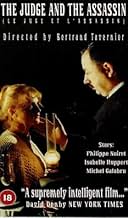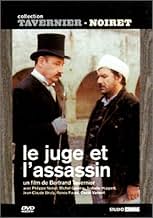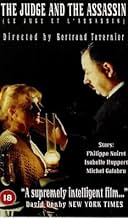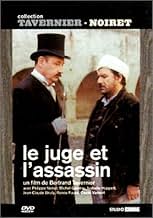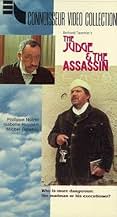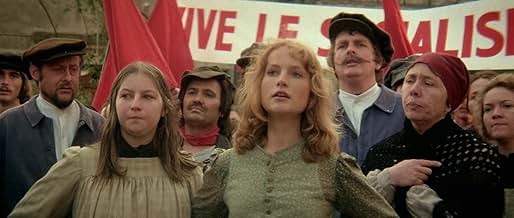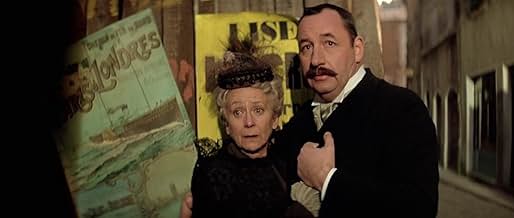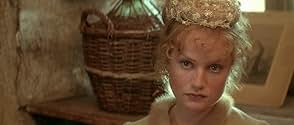Le juge et l'assassin
- 1976
- Tous publics
- 2h 8min
NOTE IMDb
7,3/10
2,5 k
MA NOTE
Un ancien sergent d'infanterie instable commet des crimes atroces. Un juge réfléchit à la manière dont cette affaire pourrait profiter ou nuire à sa carrière.Un ancien sergent d'infanterie instable commet des crimes atroces. Un juge réfléchit à la manière dont cette affaire pourrait profiter ou nuire à sa carrière.Un ancien sergent d'infanterie instable commet des crimes atroces. Un juge réfléchit à la manière dont cette affaire pourrait profiter ou nuire à sa carrière.
- Réalisation
- Scénario
- Casting principal
- Récompenses
- 3 victoires et 4 nominations au total
Jean-Claude de Goros
- Dr. Dutourd
- (as Jean-Claude de Gorros)
Avis à la une
A very cursory appraisal of the film would term it as a tale of a true murderer and rapist who killed, raped and sodomized over a dozen shepherd women in rural France before being captured and guillotined. The film is much more than that. The film is more about the respected, educated judges of France who sit in judgement of the evils of less privileged evil-doers, while they are more evil in their actions and scoff at the writings of Emile Zola, that strikes a chord with the average French citizens. One judge is called "Judas" by prisoner who has been tricked, another commits suicide as he reflects on his own past actions that mirror the actions of another. Religion plays a major but discrete role--free lunches for the poor and illiterate are free only if petitions that serve the rich are signed. A judge helps a sibling of an Asian he has condemned to death by ensuring the sibling becomes a Christian and serves him for the rest of his life. Anti-Jewish posters are pasted on outer church walls. Social comments include unwritten restrictions of a Frenchwoman being allowed to marry an Asian. A judge's mother of higher classes, providing cherries in brandy to a lower-class worker but not readily approving her to be the daughter-in-law marked by a silent disapproval when she is brought home. A judge avoids visiting his girlfriend's daughter in hospital but brings flowers for the sick person. The film is less about the "assassin" and more about real life judges and other rich individuals who "judge" the less privileged.
The film is top-notch French cinema, with notable direction and casting, a superb screenplay, good cinematography and fine performances. Tavernier and Noiret made a great team, ever since Tavernier's debut film "The Clockworker of St Paul." It is a pity that this work of Tavernier is rarely discussed and appreciated.
The film is top-notch French cinema, with notable direction and casting, a superb screenplay, good cinematography and fine performances. Tavernier and Noiret made a great team, ever since Tavernier's debut film "The Clockworker of St Paul." It is a pity that this work of Tavernier is rarely discussed and appreciated.
This stupendous film by Bertrand Tavernier is set against the background of the Dreyfus Affair and the workers' struggles which led to the formation of the Confédération Générale du Travail. Under the spotlight here is the abuse of power by institutions and the inequalities of the justice system.
The two leading protagonists are serial rapist and murderer Joseph Bouvier, based upon real life Joseph Vacher and played to the hilt by Michel Calabru whilst judge Fourquet has here become the unscrupulous Rousseau and is personified by the immaculate Philippe Noiret. His character is not, as an earlier reviewer has suggested, based upon forensic doctor Etienne Lacassagne who is here named Degueldre and is played by Yves Robert.
Bouvier and Rousseau could be said to represent both sides of the same coin. Bouvier is undeniably a monster but is clearly insane(or is he?) whilst Rousseau is in full possession of his faculties and is determined to have Bouvier guillotined in order to further his own ambition, even to the point of cleverly gaining Bouvier's trust so as to extract a full confession.
Ambiguity reigns supreme here and who better to play Rousseau than Noiret whose working relationship with Tavernier, numbering nine films, is a marriage made in heaven. Tavernier not only gifted Noiret challenging roles but wisely gave him free rein in performance. It is understandably Michel Calabru's tour de force as Bouvier that earned him a well-deserved César. His is inspired casting for he was mainly known for his appearances in the popular 'Gendarme' series and there was nothing in his cinematic CV that would suggest he was capable of a performance of this magnitude. His tenure throughout the 1950's with the Comédie Francaise undoubtedly stood him in good stead for this demanding role.
Marvellous support from Jean-Claude Brialy, veteran Renée Faure and moving up the ranks, the twenty-one year old Isabelle Huppert who would again work with Tavernier and Noiret in 'Coup de Torchon' and is here just one year away from her iconic role as 'La Dentelliere'.
We owe Tavernier a debt of thanks for having brought legendary writing duo Jean Aurenche and Pierre Bost in from the cold and as one would expect from exponents of 'cinéma de qualité', their script is beautifully crafted, intelligent and trenchant. Tavernier's unerring sense of place and period and his eye for detail are in evidence here whilst his preferred cinematographer Pierre-William Glenn ensures gorgeous rural images. Inspired score by another of Tavernier's regulars Philippe Sarde with the final song based upon revolutionary tunes from the Commune.
The final caption which points out that although Bouvier's unfortunate young victims numbered twelve, no less than twenty thousand children perished in the mines, serves as a stark reminder of how elusive was the concept of 'Liberté, Egalité, Fraternité'.
The two leading protagonists are serial rapist and murderer Joseph Bouvier, based upon real life Joseph Vacher and played to the hilt by Michel Calabru whilst judge Fourquet has here become the unscrupulous Rousseau and is personified by the immaculate Philippe Noiret. His character is not, as an earlier reviewer has suggested, based upon forensic doctor Etienne Lacassagne who is here named Degueldre and is played by Yves Robert.
Bouvier and Rousseau could be said to represent both sides of the same coin. Bouvier is undeniably a monster but is clearly insane(or is he?) whilst Rousseau is in full possession of his faculties and is determined to have Bouvier guillotined in order to further his own ambition, even to the point of cleverly gaining Bouvier's trust so as to extract a full confession.
Ambiguity reigns supreme here and who better to play Rousseau than Noiret whose working relationship with Tavernier, numbering nine films, is a marriage made in heaven. Tavernier not only gifted Noiret challenging roles but wisely gave him free rein in performance. It is understandably Michel Calabru's tour de force as Bouvier that earned him a well-deserved César. His is inspired casting for he was mainly known for his appearances in the popular 'Gendarme' series and there was nothing in his cinematic CV that would suggest he was capable of a performance of this magnitude. His tenure throughout the 1950's with the Comédie Francaise undoubtedly stood him in good stead for this demanding role.
Marvellous support from Jean-Claude Brialy, veteran Renée Faure and moving up the ranks, the twenty-one year old Isabelle Huppert who would again work with Tavernier and Noiret in 'Coup de Torchon' and is here just one year away from her iconic role as 'La Dentelliere'.
We owe Tavernier a debt of thanks for having brought legendary writing duo Jean Aurenche and Pierre Bost in from the cold and as one would expect from exponents of 'cinéma de qualité', their script is beautifully crafted, intelligent and trenchant. Tavernier's unerring sense of place and period and his eye for detail are in evidence here whilst his preferred cinematographer Pierre-William Glenn ensures gorgeous rural images. Inspired score by another of Tavernier's regulars Philippe Sarde with the final song based upon revolutionary tunes from the Commune.
The final caption which points out that although Bouvier's unfortunate young victims numbered twelve, no less than twenty thousand children perished in the mines, serves as a stark reminder of how elusive was the concept of 'Liberté, Egalité, Fraternité'.
A French provincial town in the late 1890's where a Judge attempts to advance his political power by trying to prove that a soldier was not insane at the time of committing murder, which means soilder gets the guillotine and not the mad house. A movie that is more about the social turmoil in France.
The judge and the assassin is a strange and ironic title for this film. It does not represent what your mind immediately leads you to believe. It is about the arrest and trial of a psychopath, alas French auteur style. It bears in odd-about way a resemblance to Lacombe Lucien which was released two years earlier. Featuring a bravura performance by Michel Galabru ( he worn the Cesar, the French Oscar) as the serial killer, his trial becomes a study into the mind and evil of nation at the turn of the last century. Dealing with anti-semitism, civil unrest, disobedience and the tyranny of the France and the Church can make anyone crazy and an assassin. With strong performances by Tavernier favorite actor Philippe Noiret and a young Isabelle Huppert, it is a fine film in the tradition of French cinema prior to the advent of the New Wave.
Intriguing courtroom drama based on true events , dealing with a nasty murderer called Bouvier : Michel Galabru , based on an actual series killer , proceeding a criminal spree throughout France and a prejudiced judge : Philippe Noiret who has his values challenged when he has to decide if the supect person is insane or no . And eventually, considering if it benefits or harms his career .
A suspenseful, thrilling and surprising movie with historical background during Dreyfuss affaire , and the publication of Emilio Zola's J'accuse....!. A good as well as provoking flick, including drama , thrills , violence and competent performances .The peculiar relationship that develops between the murderer and the judge in the movie's focus . It results to be a nice movie shot in French with English subtitles . Duo of protagonists , Michel Galabru and Philippe Noiriet, are frankly magnificent. They are well accompanied by a fine support cast , such as : Isabelle Huppert as judge's sweetheart , Renee Faure as possessive mother , Yves Robert and Jean Claude Brialy as Procureur.
It displays evocative and shining cinematograhy by Perre William Glenn , showing splendidly the French outdoors . As well as sensitive and moving musical score by Philippe Sarde . The motion picture was compellingly directed by Bertrand Tavernier . Bernard is deemed to be one of the best French fimmakers , writing and directing thought-provoking and interesting pictures , outstanding the following ones : "Captain Conan", "Revenge of the Musketeers" , "L627" , "Daddy Nostalgia", "Life and nothing but" , "Beatrice" , "Round Midnight", "A Sunday in the Country" , "Coup de Torchon" , Spoiled Children", "Death Watch" , "The Clockmaker" , among others . Rating : 7/10 . Better than average.
A suspenseful, thrilling and surprising movie with historical background during Dreyfuss affaire , and the publication of Emilio Zola's J'accuse....!. A good as well as provoking flick, including drama , thrills , violence and competent performances .The peculiar relationship that develops between the murderer and the judge in the movie's focus . It results to be a nice movie shot in French with English subtitles . Duo of protagonists , Michel Galabru and Philippe Noiriet, are frankly magnificent. They are well accompanied by a fine support cast , such as : Isabelle Huppert as judge's sweetheart , Renee Faure as possessive mother , Yves Robert and Jean Claude Brialy as Procureur.
It displays evocative and shining cinematograhy by Perre William Glenn , showing splendidly the French outdoors . As well as sensitive and moving musical score by Philippe Sarde . The motion picture was compellingly directed by Bertrand Tavernier . Bernard is deemed to be one of the best French fimmakers , writing and directing thought-provoking and interesting pictures , outstanding the following ones : "Captain Conan", "Revenge of the Musketeers" , "L627" , "Daddy Nostalgia", "Life and nothing but" , "Beatrice" , "Round Midnight", "A Sunday in the Country" , "Coup de Torchon" , Spoiled Children", "Death Watch" , "The Clockmaker" , among others . Rating : 7/10 . Better than average.
Le saviez-vous
- AnecdotesThis is a fairly straight-forward account of the crimes of Joseph Vacher. "Vacher" and "Bouvier" both mean "cowherd" in French. The names of many of the characters - like Lacassagne - have not been changed.
- GaffesYou can see the shadow of the microphone and the boom moving across the wall of the chapel where the priest is giving his sermon about five minutes after the beginning.
- ConnexionsFeatured in Keskiyön auringon kuvat (1987)
- Bandes originalesLa Complainte de Bouvier l'Éventreur
Music by Philippe Sarde
Lyrics by Jean-Roger Caussimon
Performed by Jean-Roger Caussimon
Meilleurs choix
Connectez-vous pour évaluer et suivre la liste de favoris afin de recevoir des recommandations personnalisées
- How long is The Judge and the Assassin?Alimenté par Alexa
Détails
- Durée2 heures 8 minutes
- Mixage
- Rapport de forme
- 2.35 : 1
Contribuer à cette page
Suggérer une modification ou ajouter du contenu manquant

Lacune principale
By what name was Le juge et l'assassin (1976) officially released in India in English?
Répondre
![Regarder Bande-annonce [OV]](https://m.media-amazon.com/images/M/MV5BMGRkZTUzMWItY2NmZi00YWFhLTllZTMtZmQzNmFjNmFkY2M5XkEyXkFqcGdeQXRyYW5zY29kZS13b3JrZmxvdw@@._V1_QL75_UX500_CR0)
